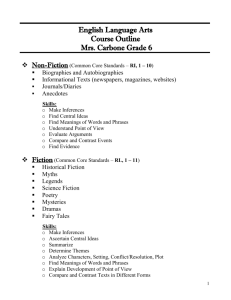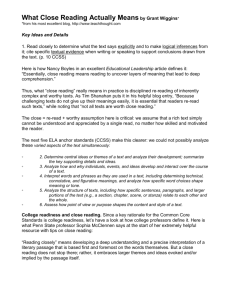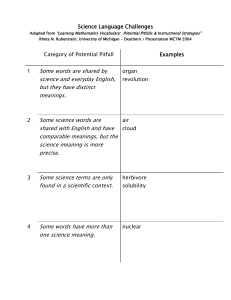Cultural studies
advertisement
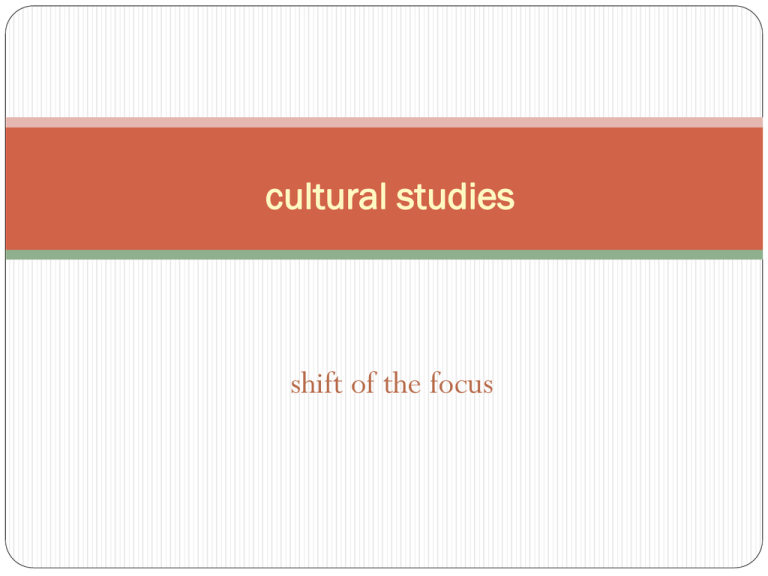
cultural studies shift of the focus culture - a general process of intelelctual and aesthetic development - a particular way of life (of people/group, period) - works and practices of intellectual and artistic activity (texts, practices that signify, produce meaning) … and ideology (the political dimension) - systematic body of ideas of a group of people (professional ideology) - distorting reality (capitalist ideology); texts presenting a particular image of reality (ideological forms) -‘myth’; connotations; universalize and legitimize what is partial and particular (operations of ideology) - as a material practice; encountered in the practices (not only in certain ideas) of everyday life (rituals/customs binding us to the social order) popular culture different definitions: well-liked by many people; or inferior culture; or mass (commercial) culture; or folk culture (originated from the people); as a site/terrain of struggle; blurring of the distinction between authentic and commercial … popular culture more than a simple discussion of entertainment and leisure … a culture that only emerged following industrialization and urbanization (change in the relations of employees/employers; residential separation of classes; repressive measures to defeat radicalism) • ‘culture and civilization’ tradition -Matthew Arnold (1867-9) Culture and Anarchy anarchy (popular culture), the disruptive nature of working-class lived culture (political dangers) – against anarchy, cultural politics - Frank R. Leavis (1930) Mass Civilization and Minority Culture culture can only be appreciated and judged by a small minority; what has changed is the status of minority (collapse of authority); threat of mass civilization and mass culture (mass democracy) • culturalism 1950s-60s analyzing the culture of a society - the textual forms and the documented practices of a culture possible to reconstitute the patterned behavior and constellations of ideas shared by the men and women who produce and consume the texts and practices of that society … it is a perspective that stresses human agency, the active production of culture, rather than its passive consumption ‘the ordinary people’ Richard Hoggart (1957) The Uses of Literacy structure of book: the working class of Hoggart’s youth (1930s) / this culture under threat from the new forms of mass entertainment of the 1950s working-class culture marked by a sense of strong community; popular culture is made by the people (lived culture) Vs the ‘shiny barbarism’ of new mass culture; the pleasures of mass culture over-excite taste, eventually dull it, and finally kill it (mindless hedonism) … not all popular culture is bad; this is true only of contemporary popular culture the analysis of culture Raymond Williams: three new ways of thinking about contemporary culture: - a description of a particular way of life - expresses certain meanings and values - the work of cultural analysis should be the clarification of meanings and values implicit and explicit in a particular way of life, a particular culture … in addressing the complex organization of culture as a particular way of life, the purpose of cultural analysis is: - to understand what a culture expressing - the actual experience through which a culture was lived - the important common element - a particular community of experience … to reconstitute the shared values of a particular group, class or society (‘structure of feeling’) (cultures in conflict) Edward P. Thomson (1963/68) The Making of the EnglishWorking Class – the political and cultural formation of the English working class the history from below: seeks to reintroduce working class experience into the historical process; working class are the conscious agents of their own making - ‘ordinary’ men and women, their experiences, their values, their ideas, their actions, their desires; popular culture as a site of resistance to those in whose interests the Industrial Revolution was made - cultures always exist in conflict and struggle to establish particular ways of life rather than evolve to form a particular way of life • cultural studies critical approaches to society and culture were proliferating throughout the world by the 1960s they systematically rejected high/low culture distinctions and took seriously the artifacts of media culture, thus surpassing the elitism of dominant literary approaches to culture the classical period of British cultural studies from the early 1960s to the early 1980s adopted a Marxian approach to the study of culture; one especially influenced by Gramsci and Althusser the context Hoggart established the Centre for Contemporary Cultural Studies at the University of Birmingham (1964); Stuart Hall directed the Centre from 1968 to 1979 … developed a variety of critical perspectives for the analysis, interpretation, and criticism of cultural artifacts ‘we have to try and see beyond the habits to what the habits stand for, to see through the statements to what the statements really mean (which may be the opposite of the statements themselves), to detect the differing pressures of emotion behind idiomatic phrases and ritualistic observances’ … the focus responding to social conflicts and movements of the 1960s and the 1970s, the Birmingham group came to concentrate on the interplay of representations and ideologies of class, gender, race, ethnicity, and nationality in cultural texts they studied the effects of newspapers, radio, television, film, and other popular cultural forms on audiences … how assorted audiences interpreted and deployed media culture in varied ways and contexts, analyzing the factors that made audiences respond in contrasting manners to media texts … the analysis British cultural studies situated culture within a theory of social production and reproduction, specifying the ways that cultural forms served either to further social control or to enable people to resist it analyzed society as a hierarchical and antagonistic set of social relations characterized by the oppression of subordinate class, gender, race, ethnic and national strata … the differentiation unlike the classical Frankfurt school, British cultural studies looked to youth cultures as providing potentially potent forms of opposition and social change … they demonstrated how culture came to constitute distinct forms of identity and group membership and appraised the oppositional potential of diverse youth subcultures … they overcame the limitations of the Frankfurt school notion of a passive audience in their conceptions of an active audience that creates meanings and the popular … the interest cultural studies focused on how subcultural groups resist dominant forms of culture and identity, creating their own style and identities on the one hand, people conform to hegemonic dress and fashion codes, behavior and political ideologies, producing their identities with mainstream groups (white, middle class, conservative …) on the other hand, people who identify with subcultures (punk, hip hop, etc) act differently, creating oppositional identities, defining themselves against standard models … questioning cultural studies developed ways to examine and critique how the established society and culture promoted sexism, racism, homophobia and additional forms of oppression, or helped to generate resistance and struggle against domination and injustice this approach implicitly contained political critique of all cultural forms that promoted oppression, while positively affirming texts and representations that produced a potentially more just and egalitarian social order overall studying the politics of culture, cultural studies attempt to show how culture both provided tools and forces of domination and resources for resistance and opposition so, individuals use media culture to generate also potentially oppositional readings, identities and subcultures … cultural studies interpreted culture within society - Stuart Hall argued that a distinction must be made between the encoding of media texts by producers and the decoding by consumers this distinction highlighted the ability of audiences to produce their own readings and meanings, to decode texts in aberrant or oppositional ways, as well as the ‘preferred’ ways in tune with the dominant ideology a case study: broadcasting the institutional structures of broadcasting, with their practices and networks of production, their organized relations and technical infrastructures, are required to produce a programme production here constructs the message; in one sense, then, the circuit begins here the institution-societal relations of production must pass under the discursive rules of language for its product to be realized … before this can have an “effect” (however defined), satisfy a need or be put to a use, it must first be appropriated as meaningful discourse and be meaningfully decoded it is this set of decoded meanings that have an effect, influence, entertain, instruct or persuade in a determinate moment the structure employs a code and yields a message; at another determinate moment the message, via its decodings, issues into the structure of social practices the circuit … frameworks of knowledge / relations of production / technical infrastructure - encoding (meaning structures 1) - programme as meaningful discourse - decoding (meaning structures 2) decoding positions a. the dominant-hegemonic position: when the viewer takes the connoted meaning of a programme and decodes the message in terms of the reference code in which it has been encoded – the viewer is operating inside the dominant code b. negotiated code or position: it acknowledges the legitimacy of the hegemonic definitions to make the grand significations (abstract), while, at a more restricted, situational (situated) level, it makes its own ground rules – reserving the right to make a more negotiated application to ‘local conditions’ c. oppositional code: decoding message in a globally contrary way – here the ‘politics of signification’, the struggle in discourse is joined implications a program becomes a text at the moment of reading, that is, when the interaction with one of its many audiences activates some of the meanings that is capable of provoking - re-empowering of the reader in terms of the social practices and the discourses they produce for the social subject - evaluating the social and cultural influences that mediate the process of reading (decoding moment) *politics of representation British cultural studies, progressively adopted a feminist dimension, paid greater attention to race, gender, sexuality, pleasure; ethnicity, nationality, identity as various relevant discourses circulated in response to social struggles and movements /race race is a cultural and historical category, a way of making difference to signify between people of a variety of skin tones what is important is not difference as such, but how it is made to signify; how it is made meaningful in terms of a social and political hierarchy this is not to deny that human beings come in different colors and with different physical features, but it is to insist that these differences do not issue meanings; they have to be made to mean (signification) … ‘the work that cultural studies has to do is to mobilise everything that it can find in terms of intellectual resources in order to understand what keeps making the lives we live, and the societies we live in, profoundly and deeply antihuman in their capacity to live with difference’ (Hall, 1996) the task for cultural studies is to help to defeat racism, and by so doing, help to bring into being a world in which the term race is little more than a long discussed historical category, signifying in the contemporary nothing more than the human race /gender though contemporary feminists have taken a diversity of approaches to popular culture, they have shared two major assumptions: - women have a particular relationship to popular culture that is different from men’s - understanding how popular culture functions both for women and for a patriarchal culture is important if women are to gain control over their own identities and change social mythologies and social relations - … Ian Ang (‘watching Dallas’) an analysis of the American prime-time soap Dallas, concerned with female pleasure trying to understand this pleasure, without having to pass judgment on whether Dallas is good or bad she is not concerned with pleasure understood as the satisfaction of an already pre-existent need, but the mechanisms by which pleasure is aroused instead of the question ‘what are the effects of pleasure?’, she poses the question ‘what is the mechanism of pleasure; how is it produced, and how does it work?’ … Janice Radaway (‘reading the romance’) the focus is the ordinary woman as romance reader - why the women read, how they read, why they read romance fiction, and how they discriminate between ideal and failed romances her conclusions on the cultural significance of romance reading are contradictory: on the one hand, if the focus is the text, romance reading seems like a surrender to patriarchy; on the other hand, if the focus is the act, romance reading appears to be an oppositional activity it is this tension, between the ‘meaning of the act’ and the ‘meaning of the text’ that must be analyzed if we are to understand the full meaning of romance reading … Judith Buttler (queer theory) on the performativity of gender … the gender is not an expression of biological sex, it is performatively constructed in culture gender identities consist of the accumulation of what is outside (i.e. in culture) in the belief that they are an expression of what is inside (i.e. in nature) femininity and masculinity are not expressions of ‘nature’, they are cultural performances in which their ‘naturalness is constituted through discursively constrained performative acts that create the effect of the natural, the original and the inevitable /taste for Pierre Bourdieu, taste is a profoundly ideological category it functions as a market of ‘class’ (using the term in the double sense to mean both socio-economic category and a particular level of quality) … consumption is predisposed, consciously and deliberately or not, to fulfill a social function of legitimizing social difference – cultural distinctions are often used to support class distinctions … distinction distinctions of culture (whether understood as text, practice or way of living) are a significant aspect of the struggle between dominant and subordinate groups in society Bourdieu’s purpose is not to prove the self evident – that different classes have different lifestyles, different tastes – but to interrogate the processes by which the making of cultural distinctions secures and legitimates forms of power and control rooted in economic inequalities … how differences are used by the dominant classes as a means of social reproduction creation of a ‘cultural field’? John Fiske: commodities from which popular culture is made circulate in two simultaneous economies, the financial and the cultural whereas the financial economy is primarily concerned with exchange value, the cultural is primarily focused on use – meanings, pleasures, and social identities … resistance to the power of the powerful by those without power (in western societies) takes two forms, semiotic and social; popular culture is a semiotic battlefield critique McGuigan (1992): the separation of contemporary cultural studies from the political economy of culture has been one of the most disabling features of the filed of study … what can political economy offer to cultural studies? … collapsing everything back into the economic? the challenge keeping in active relationship production, text and consumption … what is needed is an understanding of the relationship between structure and agency … there is always a dialogue between processes of production and the activities of consumption * notes from the books: - Bourdieu, P. (1986) Distinction a Social Critique of the Judgment of Taste - Durham, M. G. and Kellner, D. (eds.) (2006) Media and Cultural Studies: Key Works (revised edition) - Hall, S., et. al. (eds.) (1980) Culture, Media, Language - Storey J. (2009) Cultural Theory and Popular Culture: a Reader (4th edition) - Storey J. (2009) Cultural Theory and Popular Culture: an Introduction (5th edition) questions for discussion where do you find yourselves in Hall’s encoding-decoding model? can you bring examples of media representations of race and gender and critically evaluate the discourse they produce? what do you think about the conception of identity as cultural performance? do you agree with Bourdieu’s analysis on taste and the cultural distinctions? thank you for your attention workshop work in groups and make a list of your tastes come to discuss them in the class in relation to: - gender differences; their meanings (‘text’ Vs ‘act’); their performative role; and their cultural distinction workshop - one group working on the role of mass media in promoting new lifestyles in Turkey - the other group working on traditional customs and ways of life that are threatened by the role of mass media in Turkey … present your arguments
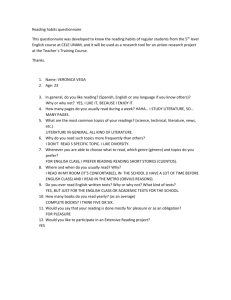

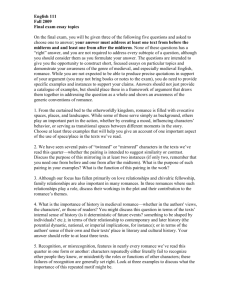
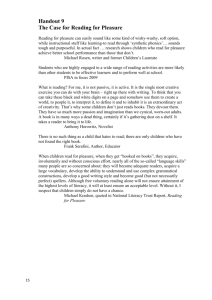
![Word Study [1 class hour]](http://s3.studylib.net/store/data/007905774_2-53b71d303720cf6608aea934a43e9f05-300x300.png)
